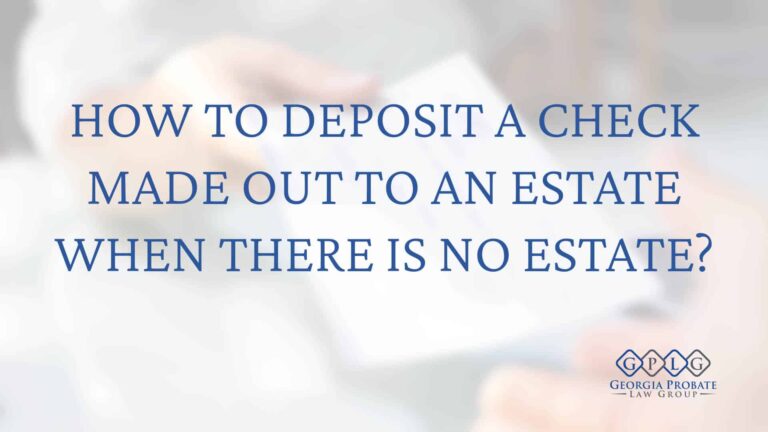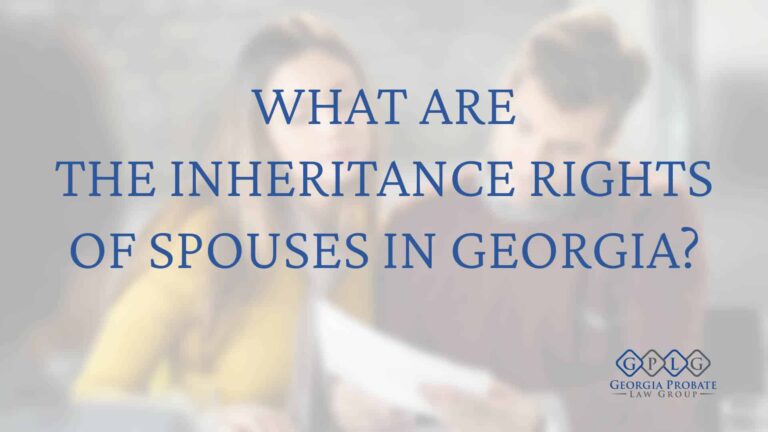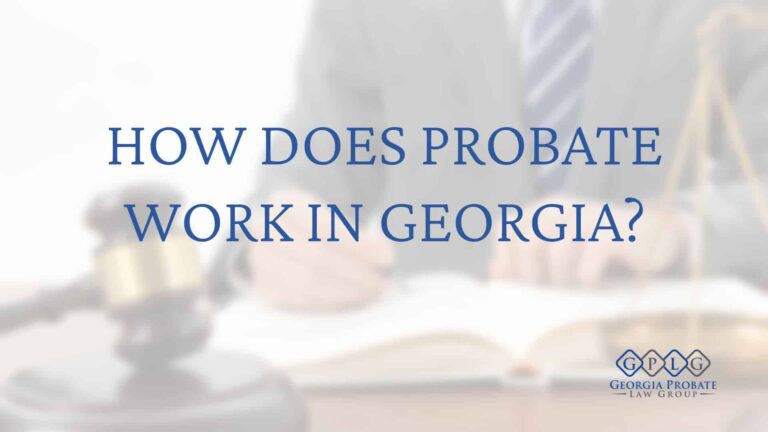Probate is a legal process where a probate court supervises the settlement of an estate upon the death of a person and the distribution of their remaining assets. If the decedent left a will behind, his estate will be allocated according to his desires. If they die intestate (without a will), their possessions will be distributed according to the Georgia intestacy. Even if it has many advantages, many people would like to know how to avoid probate.
This is because probating a deceased person’s estate might become expensive, time-consuming, and emotionally charged, which most families would want to avoid.
Continue to read this post to find out some savvy tips and find several ways that could help you have your assets passed directly to your beneficiaries.
Why Would You Want to Avoid Probate Court?

There are various reasons for avoiding the probate process. While some of them are personal, others are a matter of time and money:
Lack of Privacy
When the probate process starts, it becomes a matter of public record.
The lack of privacy might impact the value of the decedent’s assets and their distribution to heirs and beneficiaries.
It could also affect people looking to keep their personal situation private.
Time
Even if the executor or administrator is organized, has advanced legal knowledge, and adequately completes their duty, and there are no disputes among the heirs, the probate still can be a lengthy process.
In Georgia, it generally takes twelve to eighteen months to settle an estate, considered from the moment of filing the probate until its formal closure.
Besides, any challenge of the will, disputes between family members of the deceased, or potential objections to the appointment of the executor or administrator could add additional steps to the probate proceedings, prolonging this timeline.
Delay in the distribution of the assets
Locating and validating the will, collecting all the estate assets, identifying the creditors, and paying the debts take time and could delay the distribution of inheritance to family members and beneficiaries.
Moreover, if the decedent owned properties in multiple states, the executor or administrator needs to open probate in each state, situation that extends the timeline and delays the transfer of assets.
Cost
The cost generally includes fees for filing fees, costs for running a creditor/debtor ad in a local newspaper, executor fees, and probate attorney’s cuts.
All of them are paid from the estate funds, denting the amount of money your loved ones will receive.
In addition, the more complex the estate is, the longer the probate process will take and the higher the costs.
How to Avoid Probate in Georgia & Secure Your Estate
First of all, it depends on when this question arises.
If it appears after a person died, and the family members wonder if they could eventually avoid probate. In such a situation, most often, it’s not possible to avoid the probate, unless the deceased made the proper arrangements during his/her lifetime.
If the question surfaces while the person is still alive, voiding probate is neither impossible nor expensive but requires proper estate planning and legal guidance.
In Georgia, you don’t have to open an estate upon someone’s death.
Also, you could skip the probate when your estate includes exclusively non-probate assets. Therefore, you should consider the ownership of your properties and make any necessary changes.
Here is a list of seven potential ways to avoid the probate process:
Depending on your specific situation, you might use one method or a combination of them that would suit you best.
Joint Ownership of Property
Joint Tenants With Rights of Survivorship, also known as JTWROS, refers to the legal right of a joint tenant to claim real or personal property upon the death of a co-holder, being an easy and simple way to skip probate.
JTWOS means that if one owner dies, titles pass automatically to the surviving owner(s).
Georgia joint tenancy has the advantage of being available to non-married persons and is not limited to two co-owners. Accounts that can be listed as Joint Tenants With Rights of Survivorship are:
- bank accounts – checking and savings accounts; if one of the joint owners passes, the surviving owner(s) becomes the only account owner, and the deceased person’s name is deleted from the account.
- real estate property – houses, land, and other properties can have a JTWROS designation. However, it’s critical to be aware that any loans or mortgages against the property become the duty of the surviving owner(s) when one of the joint owners dies.
- personal belonging is an asset that can be moved and not fixed in one location, such as, for example, a house. Usually, an automobile is personal property owned as JTWROS, but it could also be collectibles, artwork, or other assets with a monetary value.
Living Trusts
Living trusts are another excellent option for people asking how to avoid probate. They are also called “revocable living trusts” because the trustor can revoke them anytime during their life.
When setting up a trust, it becomes the owner of the assets you used to fund it. Living trusts are usually preferred when there are large estates or multiple beneficiaries, the main advantage being the assurance of confidentiality that is lacking when making a will.
When creating a living trust, the settlor (trustor) executes a document where he decides the trust’s terms and funds it. He also chooses the beneficiaries and trustees and indicates how the trust’s assets will be managed and distributed.
Upon the trustor’s death, the successor trustee ensures that the assets are transferred to the established beneficiaries as per the trust document. He is also able to manage the trust during the settlor’s life if the latter becomes mentally incapacitated.
Give away property

Another easy way to bypass the probate process is to “gift” or transfer a property you own to another person before you die.
Once you are no longer the asset owner, it can no longer be part of your estate.
Not being able to use that property is the main drawback in this case.
Also, you should know that when a gift exceeds a certain amount, it might be subject to the federal gift tax.
Nowadays, the maximum amount you could give away without filing a gift tax return is about $18.000. However, we advise you to consult an estate lawyer to help you learn about this exclusion amount.
Pay-on-death accounts and real estate
According to Georgia state law, you can transform accounts such as certificates of deposit or savings accounts payable-on-death (POD) accounts and name a beneficiary who will inherit it upon your death.
During your life, all the money in the account is still yours. Upon your death, your beneficiary could claim the money directly from the financial institution without going through probate.
Georgia law also allows transfer-on-death (TOD) registration for brokerage accounts, stocks, and bonds. This means the assets in these accounts will be transferred automatically to their designated beneficiaries.
The security owner or account holder indicates who receives what.
You may designate beneficiaries to assets like:
- Retirement account.
- Life insurance policy.
- Securities.
- Bank accounts.
However, you should know that Georgia state law does not allow transferring motor vehicles and real estate deeds with TOD.
Community Property Agreements
Although they are not available in Georgia, you should know about community property agreements as a method of skipping probate. They are a form of joint tenancy just for married couples.
According to them, any property acquired during the marriage is considered joint tenancy, and consequently, the surviving spouse will inherit the deceased’s shares.
Community property agreements are accepted in Wisconsin, Alaska, Texas, Idaho, and Washington.
Legal simplified proceedings for small-value estates
There are some simplified legal proceedings for those who do not want to avoid the probate process entirely but want to speed up the process of settling and distributing the decedent’s assets.
While other states accept small estate affidavits as a simplified procedure, in Georgia state, it is called no administration necessary. This shortcut can be used for very simple estates where there is no will, no creditors to the estate, and all parties involved will sign off on it.
How to Avoid Probate on Bank Accounts?

Even if there are methods to avoid probate on bank accounts, you should be aware that they also come with specific conditions.
One such condition is jointly owning an account or naming designated beneficiaries. This way, the bank accounts become non-probate assets, avoiding the probate process.
Some other ways to bypass the probate on bank accounts are:
- Payable-on-Death (POD) accounts – as mentioned before, the funds are automatically released to the named beneficiary upon the account holder’s death.
- Transfer-on-Death (TOD) accounts – upon the death of the TOD account holder, the funds are automatically transferred to the designated beneficiary.
- joint ownership – even if this is typically a great way to avoid probate, you should know that, in this case, you would lose complete control of your bank account.
How to Avoid Probate Without a Trust?
Even if living trusts are the most common way when deciding how to avoid probate, they are not the only one. As we have mentioned in this article, several conditions must be met to avoid probate:
- The deceased must own only non-probate assets.
- The decedent has no unpaid debts.
- All heirs agree with the late person’s estate plan.
How Do You Avoid Probate on a Home?
According to Georgia estate laws, there are several methods you could use to avoid probate on a home:
- Joint Tenancy With Rights of Survivorship (JTWROS) – when two or more persons jointly own a property, the shares of the decedent co-owner automatically pass to the remaining owner(s).
- Giveaway homes – you may “gift” or transfer your house to someone else before you die. In this case, it will no longer be part of your estate, so it can’t be subject to probate.
- Living trust – you might transfer your house into a living trust and designate a beneficiary who will receive it upon your death. This way, the house will become a non-probate asset, avoiding the probate proceedings.
Does a Will Avoid Probate in Georgia?
The answers to whether or not a will avoids probate in Georgia are “yes” and “no”.
While the law doesn’t require to open a probate estate, Georgia requires wills to be filed with the probate court. It all depends on whether the deceased had probate assets or not at the time of their death.
If the decedent owned solely non-probate assets, then you don’t have to probate the will; it’s enough to file it with the probate court. However, if the late person also owned probate assets, then their estate must go through probate proceedings.
Non-probate assets examples:
- Life insurance policies with beneficiary designations.
- Certificates of deposit with named beneficiaries.
- Bank accounts that have a POD (Payable on Death) or TOD (Transfer on Death) listed on the account.
- IRA, 401K with a designated beneficiary, Payable-on-Death or Transfer-on-Death on the account.
- Real estate or land titled with other parties as Joint Tenants with Rights of Survivorship or real estate with joint ownership.
Consult a Probate Lawyer to Know Your Options
Regardless of the size of the inheritance, finding out whether it should not go through the probate process should not be taken lightly, especially when important assets or the financial stability of the deceased’s family members are involved.
If you find yourself in the situation of dealing with the death of a loved one and settling their inheritance and need to know how to avoid probate, contact our office at (770) 796-4582 to schedule a consultation.
More information
Disclaimer These websites have not been reviewed by Georgia Probate Law Group and are not endorsed or even recommended by Georgia Probate Law Group. These websites are additional resources that you can use to further your general education on this topic.
Disclaimer: The information above is provided for general information only and should not be considered legal advice. Our probate attorneys provide legal advice to our clients after talking about the specific circumstances of the client’s situation. Our law firm cannot give you legal advice unless we understand your situation by talking with you. Please contact our law office to receive specific information about your situation.

























